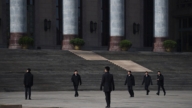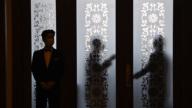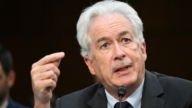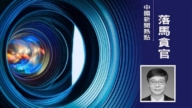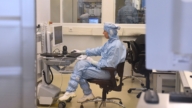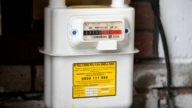【新唐人2014年04月05日讯】中共总书记习近平“十八”大后,提出了“苍蝇、老虎一起打”的反腐口号,也真打掉了省部级贪官19人,其中蒋洁敏、李崇禧和公安部副部长李东生都是正部级。不过,有人算了一笔经济账,认为中共反腐会损失几千亿人民币。人们想知道的是,中共大代价反腐真能起到作用吗?请看以下报导。
根据世界最大银行之一的美国“美林银行”本周公布的一份报告显示,仅今年一年,中共政府会为它的反贪腐运动,付出1000多亿美元的经济代价。
“美林银行”的报告指出,习近平提倡反对公款大吃大喝、反对公费送礼以来,产生了微观效应,例如餐饮业和奢侈品销售的利润大减。但“美林银行”同时认为,中共禁止公款消费和减少行政支出的命令,使得中国国内消费急剧下降。
粗略估计,因经济活动减少带来的损失,可能就会有1350亿美元,相当于人民币8000多亿。
“美林银行”还说,从去年初开始,中国国有银行的存款数量飙升近30%,这正是经济活动减少的体现。
旅美政论家伍凡:“用政治压力解决贪污腐败,而不是用法律、用法制或者是用舆论监督、法律监督这个方法。如果从反腐败的现象来看,这种反腐败能持久吗?”
2012年底,美国《彭博社》杂志追踪了中共八大元老——邓小平、陈云、王震、薄一波等人的后代,103名家庭成员的经济状况。《彭博社》指出,这些红色贵族通过控制国有企业,创办私人企业积敛了巨额财富。仅王震之子王军、邓小平的女婿贺平、以及陈云之子陈元三人,所控制的国有企业的资产规模,就有1万6000亿美元。
至今,这些太子党无一人被查。
英国《路透社》最近引用与中共最高层有联系的三名消息人士的话说,当局没收了上任中共中央政法委书记周永康家族,至少900亿元人民币的财产,这包括在中外银行账户的370亿元存款,和总额高达510亿元人民币的中外债券,以及其他数百处房产、无数的古董、字画等。
但中共处理“大老虎”周永康的情况,目前陷入了困境。
英国《金融时报》最近从中共体制内得到消息说,中共前任领导人江泽民和胡锦涛已分别表示,为避免反腐涉及过多党内高层的家族利益,此次反腐打击的范围不能过大。他们警告习近平,“反腐”持续太久会削弱共产党在民众中的支持度,威胁政权的稳定。
时事评论员蓝述:“从体制这个层面来讲,中共的腐败它的根源不是一个经济问题,它的根源是一个政治腐败,是高度集权之后,不受制衡的权力所造成的政治腐败。”
时事评论员蓝述认为,中共的政治腐败是核心,经济腐败只是表象。而中共现在处理经济腐败,还是想维护一党独裁的政治制度,也就是想通过反对表面腐败,维持核心的腐败,效果可想而知。
其实,中共的腐败也渗入到各个阶层。
调查显示,2011年中国的“灰色收入”为6万2000亿元,约占GDP总量的12%。而这么巨大的灰色收入,大都落入各级官员的腰包,成为贪官权贵的盘中飧。
美国中文杂志《中国事务》总编辑伍凡指出,如果你在国内限制这些权贵集团,他们就会把钱花到外国去,把财产转移到国外去。
今年,美国独立新闻组织“国际调查记者联盟(International Consortium of Investigative Journa-lists,ICIJ)”发表了一份调查报告,其中披露,中共高层精英及他们的近亲们,多年来在加勒比海“避税天堂”拥有秘密离岸公司。据估计,自2000年以来,通过离岸公司管道流出中国的金额,最高达 4万亿美元。
身在俄罗斯的前美国情报人员斯诺登也曾公布,中共官员在国外存款达4万8000亿美元。有人算了一笔账,中共贪官们的海外资产,可以让全体中国人民免费医保625年!
采访/易如 编辑/宋风 后制/孙宁
The Cost of Anti-Corruption: Hundreds of Billions RMB
Since Xi Jinping vowed to tackle corrupt officials both big and small, tigers and flies, as many as 19 provincial senior officials as well as officials at the ministerial level such as Jiang Jiemin, Li Chongxi, and Li Dongsheng were sacked. However, it comes with a cost.
An economic analysis suggested that anti-corruption will cost China hundreds of billions of RMB. Will the anti-corruption really work? Please follow our report.
A report by Bank of America Merrill Lynch this week showed the Communist regime’s anti-graft campaign could cost more than $100 billion this year alone.
According to BBC ‘s analysis, Merrill Lynch ‘s report suggested many of the micro effects of Xi Jingping’s anti-corruption drive have already been well documented of course; a slowdown in the restaurant trade for example, and a big dip in sales of luxury goods.
The prohibition on government consumption and the chill on administrative spending are estimated to cause sharp reduction in domestic consumption.
A rough calculation by the BBC report, this reduction could add up to as much as US $135 billion, which is the equivalent of 800 billion RMB.
Merrill Lynch report also said that since early last year, government bank deposits have been soaring, up almost 30% year on year, a manifestation of reduced economic activity .
Wu Fan, political commentator: “The regime ‘s anti-corruption was through political pressure, rather than by supervision of the legal system or public opinion. Can the phenomenon of anti-corruption really last?"
By end of 2012, Bloomberg News mapped the families of Communist China ‘s “Eight Immortals" and tracked the wealth of 103 of their descendants. The heirs ran or held top positions in state-owned companies to amass wealth and influence. Three children alone — General Wang ‘s son, Wang Jun; Deng ‘s son-in-law, He Ping; and Chen Yuan, the son of Mao ‘s economic tsar — headed or still run state-owned companies with combined assets of about $1.6 trillion in 2011.
So far, none of these princelings have been put under investigation.
Reuters recently reported according to three sources that the Communist regime has seized assets worth at least 90 billion yuan ($14.5 billion) from Zhou Yongkang and his family.The party’s anti-corruption watchdog had frozen bank accounts with deposits totaling 37 billion yuan and seized domestic and
overseas bonds and stocks with a combined value of 51 billion yuan.
Investigators had also confiscated hundreds of apartments, villas, as well as numerous antiques and contemporary paintings.
But the regime seems to get stuck with the “big tiger" Zhou Yongkang ‘s case.
Financial Times recently reported that insiders ‘ pointed out that former leaders Jiang Zemin and Hu Jintao have both sent messages to Xi Jinping, that in order “not to take on too many of the powerful families or patronage networks at the top of the party hierarchy,"
“the footprint of this anti-corruption campaign cannot get too big."
Xi Jinping was warned “that a campaign that lasted too long and
was too harsh could erode support among the Communist party ‘s
rank and file and threaten the stability of its rule.”
Lan Su, commentator: “From the perspective of the regime system, the Communist regime corruption is not about economy, but rather a political issue. This political issue has been caused by the highly centralized political corruption which lacks checks and balances of power. “
Commentator Lan Su analyzes that the political corruption of the Communist regime is the core of the root, and the economic corruption is just what it presents. The CCP ‘s tackling the economic corruption has been exactly
targeting what it reflects, so that the one-party authoritarian political system, i.e., the core political corruption, is maintained. The ineffectiveness is imaginable.
In fact, the political corruption has infiltrated to the entire Chinese society.
Research found, the undeclared “gray income" reached 6.2 trillion RMB (about $1 trillion) in 2011, or about 12% of GDP. Majority of the gray income can easily be channeled out into private pockets of the corrupt officials and political elites.
Commentator Wu Fan believes that those powerful and elite groups of the regime will find a way to spend their wealth, if restricted in China, such as transfer assets overseas.
This year, International Consortium of Investigative Journalists, ICIJ, reported financial records that revealed close relatives of China’s top leaders have used secretive offshore companies in Caribbean tax havens that helped shroud the Communist elite’s wealth.
As much as US $4 trillion in untraced assets have left China through these offshore companies since 2000.
Living in Russia, former U.S. intelligence officer Snowden has revealed that the Communist officials had foreign deposits amounting to US $4.8 trillion. This amount was calculated could support the entire Chinese population’s free medical insurance for 625 years.
Interview/SongFeng Post-Production/SunNing


